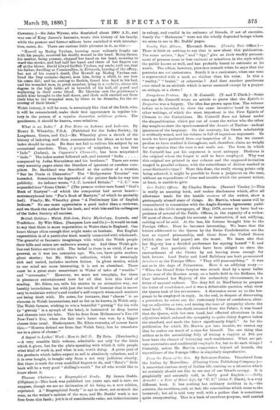British Goblins : Welsh Folk-lore, Fairy Mythology, Legends, and Traditions.
By Wirt Sikes. (Sampson Low and Co.)—Itwould be rash to say that there is more superstition in Wales than in England. One hears things often enough that might make us hesitate. But English superstition is of a particular kind, mostly connected with witchcraft. The graceful or fantastic imaginings with which the Welsh people their hills and mines are unknown among Us. And these Welsh gob- lins and fairies survive still. The belief in them is as vivid, if not as general, as it was ten centuries ago. We, tee, have quite modern ghost stories ; but Mr. Sikes's collection, which is amazingly rich and varied, includes modern fairies. In ghost stories, which to our mind are more interesting, it is not so abundant. There must be a great store somewhere in Wales of tales of " wraiths " and "revenants." However, we must not complain, for there is plenteous entertainment here for all that love this kind of reading. Mr. Sikes, too, tells his stories in an attractive way, not harshly incredulous, but with just the touch of humour that is neces- sary to maintain writer's and reader's self-respect when such matters are being dealt with. He notes, for instance, that " cheese " is an element in Welsh incantations, and as far as he knows, in Welsh only. 'he Welsh farmer, wishing to win a beautiful " gwraig " for his wife (a "gwraig " is a nymph of the lake), is instructed to drop loaves and cheeses into the lake. This he does from Midsummer's Eve till New-Year's Eve, when the fair one's heart was won by a bigger cheese than usual. Shakespeare, Mr. Sikes remarks, of course knew this,—" Heaven defend me from that Welsh fairy, lest he transform me to a piece of cheese."


































 Previous page
Previous page